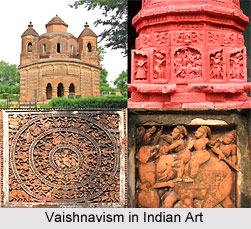 Influence of Vaishnavism on Bengali Literature took place between the fifteenth and seventeenth century. Vaishnavism was the dominant religion after Buddhism. Vaishnavism spread with a dynamic force of a great revivalist movement. It provided an efficient organization for the masses who had been left without a refuge after the disappearance of Buddhism. Vaishnavism was one of the main influences that were responsible for the intellectual black-out and the emasculation of national life in pre-British Bengal. This was because of the over emotional nature as it paid more attention to the life of love and devotion. It craved for union with a personal god absorbed in the emotion of love. With its designed cult of love and its mass singing and dancing, it induced those states of mystical ecstasy and trance in which intellectuality play no role and the powers of action are paralysed.
Influence of Vaishnavism on Bengali Literature took place between the fifteenth and seventeenth century. Vaishnavism was the dominant religion after Buddhism. Vaishnavism spread with a dynamic force of a great revivalist movement. It provided an efficient organization for the masses who had been left without a refuge after the disappearance of Buddhism. Vaishnavism was one of the main influences that were responsible for the intellectual black-out and the emasculation of national life in pre-British Bengal. This was because of the over emotional nature as it paid more attention to the life of love and devotion. It craved for union with a personal god absorbed in the emotion of love. With its designed cult of love and its mass singing and dancing, it induced those states of mystical ecstasy and trance in which intellectuality play no role and the powers of action are paralysed.
Vaishnavism made the mistake of trying to raise the spiritual level of a people without trying to raise their material and intellectual level. It enticed its followers to an unreal world of its own fabrication. For two centuries the people of Bengal people sang, danced, and passed out in an ecstatic trance. The poetry inspired by Vaishnavism was exclusively dominated by eroticism and mysticism. It disowned the intellect altogether. It focussed mainly on legends of lord Krishna and Radha.
Rabindranath`s influence of Vaishnavism was limited. However on Chittaranjan its influence was all all-pervasive. Rabindranath Tagore under Vaishnava influence has written many Baul songs. The tradition of songs on the Radha-Krishna legend was popular with the works of Chandidas (late 14th century.) in Birbhum district. He was among the earliest poets in the emerging Bengali language. In the year 1474, Maladhar Basu translated the 10th and 11th cantos of the Sanskrit Srimad Bhagavat into Bengali which is known by the name of Srikrishnavijay. Chandidas and Maladhar Basu laid the foundation of Vaishnava poetry in Bengal.
Major poets who followed the Padavali tradition included Murari Gupta (srikrishnachaitanyacharitrAmrita), Narahari Sarkar, Basudev Ghosh, Lochandas, Jnanadas, Govindadas, Balaram Das, Syed Sultan and Dwija Chandidas. Seventeenth century witnessed the works of Kaviranjan, Kavishekhar, Radhaballabh Das, Ghanashyam Das and Ramgopal Das. In the eighteenth century the tradition wwas carried out by Vaisnavadas, Chandrashekhar, Radhamohan Thakur, Narahari Chakravarty (gitachandroday), Yadunandan and few others.
The re-emergence of Vaishnavism and Bhakti confirms how firmly they have entrenched themselves in the national tradition. In the 14th century Baru chandidas composed Shrikrishnakirtan in Bengali that was the first epic in Bengali language. Charitakavya Vaisnava biographies grew out of the life stories of Chaitanya. Monumental poetical works were composed that focussed about the lives of contemporary historical personalities.



















